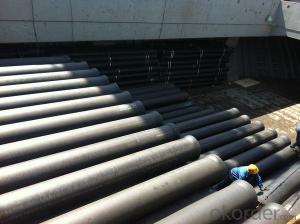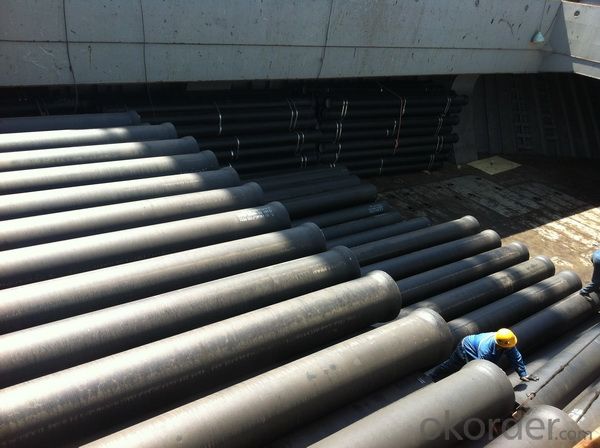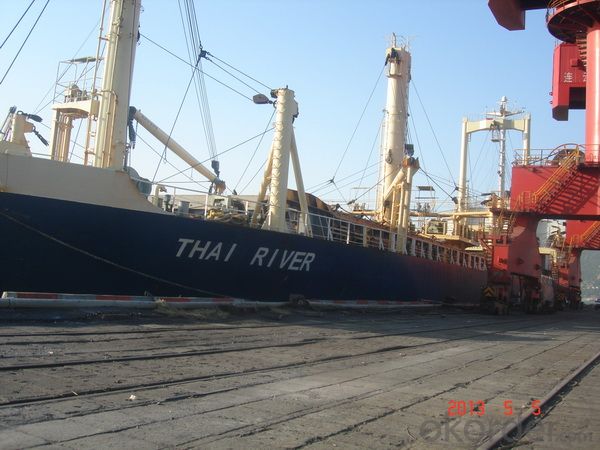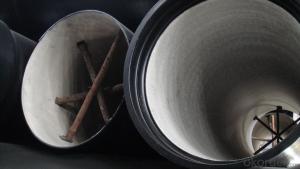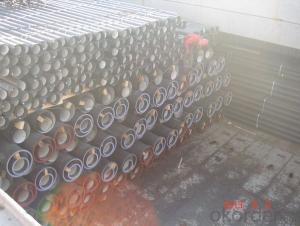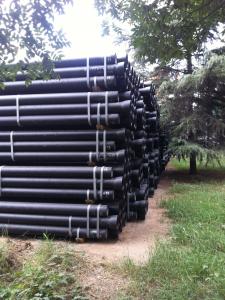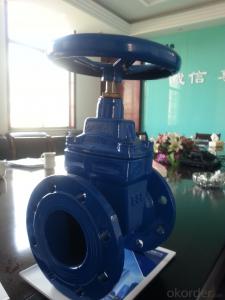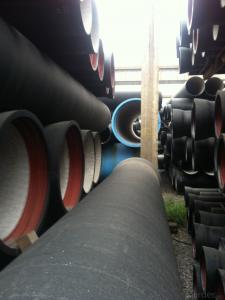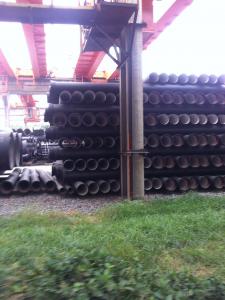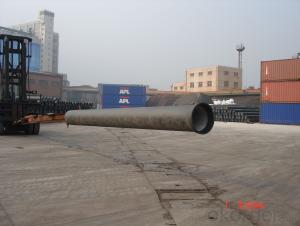DUCTILE IRON PIPES AND PIPE FITTINGS k8 CLASS DN100
- Loading Port:
- Tianjin
- Payment Terms:
- TT OR LC
- Min Order Qty:
- 22 pc
- Supply Capability:
- 3000 pc/month
OKorder Service Pledge
OKorder Financial Service
You Might Also Like
Material : Ductile Cast Iron
Size Range : DN 80mm to DN 2000mm
Unit Effective Length : 6m or 5.7m
Manufacture Standard: ISO 2531:1998/ EN 545:2006/EN 598:2007
Annual capacity : 200,000 tons
Coating Exterior: Zinc 130g/m2 according to ISO 8179-1 and bitumen coating 70 microns.
Cement Interior: Portland Cement/ High Alumina Cement/ Sulphate Resisting Cement Lining according to ISO 4179
Special requirements on external coating and internal lining can be applied
We also provide accessories such as SBR/EPDM rubber gaskets, lubricant paste, pipe caps, PE sleeves, etc.
Additional Parts:
Each pipe is strictly inspected according to related standard to ensure permanently high performance.
Easy Installation at site and service free for life
Long Service Lifespan
Quotation will arrive you within 24hours once we get your inquiry.
We guarantee offering you a competitive price.
A copy of original inspection reports of pipes will be offered after shipment.
Photos of loading process will be sent to the customer after shipment effect.
We will follow-up the delivery progress after shipment effect and update to the customer on weekly basis.
- Q: What is the maximum operating pressure for ductile iron pipes?
- The maximum operating pressure of ductile iron pipes may vary based on factors like pipe diameter, wall thickness, and the specific usage. Nonetheless, typically, ductile iron pipes are engineered to endure pressures of up to 350 psi (pounds per square inch), and occasionally even higher. It is worth highlighting that to ascertain the precise maximum operating pressure for a specific ductile iron pipe system, one should refer to local regulations, engineering standards, and manufacturer specifications.
- Q: Are ductile iron pipes suitable for power plant applications?
- Yes, ductile iron pipes are suitable for power plant applications. Ductile iron pipes are known for their high strength and durability, making them capable of withstanding the high-pressure and high-temperature conditions typically found in power plants. Additionally, ductile iron pipes have excellent corrosion resistance, which is crucial in power plant environments where water and chemicals are often present.
- Q: Can ductile iron pipes be repaired if they are damaged?
- Yes, ductile iron pipes can be repaired if they are damaged. The extent of the damage will determine the type of repair that is needed. In cases where the pipe is cracked or has small holes, a repair clamp or a stainless-steel sleeve can be used to seal the damaged area. These methods provide a temporary fix and allow for the flow of water to continue until a more permanent repair can be made. For more severe damage, such as large cracks or broken sections, a full replacement may be necessary. This involves cutting out the damaged section of the pipe and installing a new piece. This process requires specialized equipment and expertise, but it can effectively restore the functionality of the pipe. It is important to note that the repair of ductile iron pipes should be carried out by trained professionals who have experience in working with this type of material. This ensures that the repairs are done correctly and do not compromise the integrity and safety of the pipeline system. Regular inspection and maintenance of ductile iron pipes can help identify any potential issues early on and prevent extensive damage that may require replacement rather than repair.
- Q: Are ductile iron pipes suitable for use in acidic environments?
- Yes, ductile iron pipes are suitable for use in acidic environments. Ductile iron has excellent corrosion resistance properties, making it a reliable choice for transporting wastewater or other fluids with acidic content. It can withstand the corrosive effects of acids, providing durability and longevity to the piping system.
- Q: Are ductile iron pipes suitable for use in mining tailings pipelines?
- Mining tailings pipelines can utilize ductile iron pipes due to their suitability for this purpose. These pipes possess remarkable strength and durability, enabling them to endure the harsh and abrasive conditions often encountered in mining operations. With their high tensile strength, they can effectively handle the pressure and weight of the tailings material. Furthermore, their resistance to corrosion is crucial in mining environments where the tailings may contain corrosive chemicals or substances. Moreover, ductile iron pipes are known for their ease of installation and maintenance, providing a valuable advantage in time-sensitive mining operations. Ultimately, ductile iron pipes offer a dependable and cost-effective solution for mining tailings pipelines.
- Q: Do ductile iron pipes require external coatings or wraps?
- Ductile iron pipes typically require external coatings or wraps to protect against corrosion. Despite being strong and durable, ductile iron is still prone to corrosion when exposed to specific environmental conditions. Applying external coatings or wraps adds an extra layer of protection, extending the lifespan and maintaining the structural integrity of the pipes. These coatings can vary and may consist of materials like epoxy, polyethylene, or zinc, acting as a barrier between the pipe surface and corrosive elements in the environment. Additionally, wraps made of materials such as polyethylene or polypropylene can provide mechanical protection against impact or abrasion. Therefore, it is generally advisable to apply external coatings or wraps to ductile iron pipes to enhance corrosion resistance and ensure long-term performance.
- Q: How are ductile iron pipes connected or jointed together?
- Ductile iron pipes are typically connected or jointed together using various methods such as flanged joints, push-on joints, mechanical joints, or restrained joints. These methods ensure a secure and leak-free connection between the pipes, providing a reliable and durable pipeline system.
- Q: How to distinguish flexible and rigid interfaces between cast iron pipe joints
- Flexible connections can be kept watertight at any angle (lateral or vertical), and rigid, where the interface of a pipe is easy to crack if a slight earthquake is encountered
- Q: How can the steel plastic composite pipe be connected with the cast iron pipe?
- Use stainless steel clamps to connect.
- Q: Ductile iron and gray iron is what are the advantages and disadvantages of it
- Comparison of ductile iron and cast iron (gray iron)Compared with cast iron, ductile iron has an absolute advantage in strength. The tensile strength of ductile iron is 60K, while the tensile strength of cast iron is only 31k. The yield strength of ductile iron is 40K, while the cast iron does not show yield strength, and eventually breaks. The strength to cost ratio of ductile iron is far superior to that of cast iron. Ductile iron is the same as cast iron in corrosion resistance.
Send your message to us
DUCTILE IRON PIPES AND PIPE FITTINGS k8 CLASS DN100
- Loading Port:
- Tianjin
- Payment Terms:
- TT OR LC
- Min Order Qty:
- 22 pc
- Supply Capability:
- 3000 pc/month
OKorder Service Pledge
OKorder Financial Service
Similar products
Hot products
Hot Searches
Related keywords
